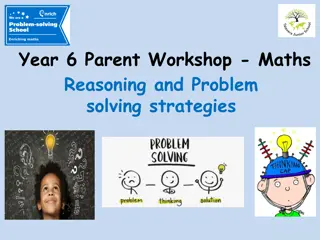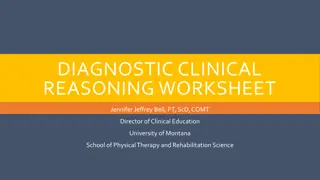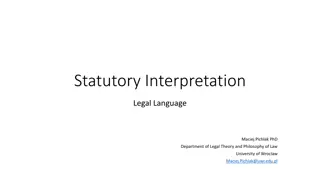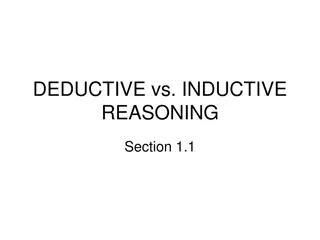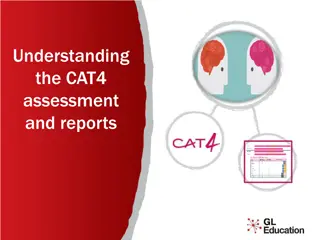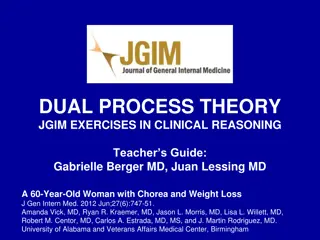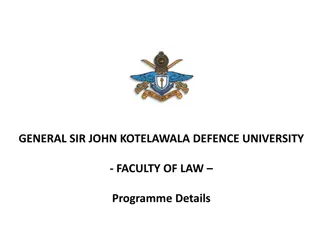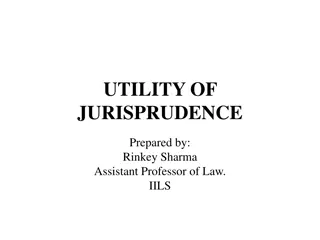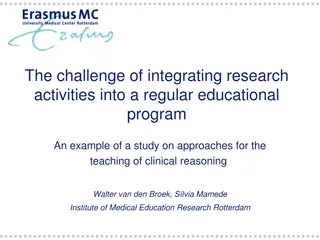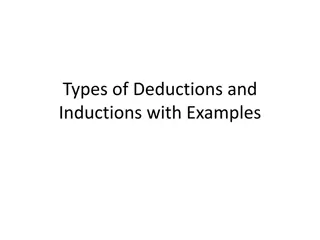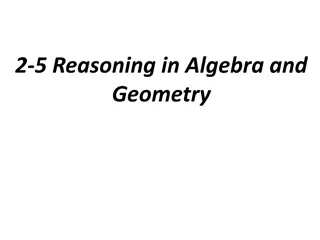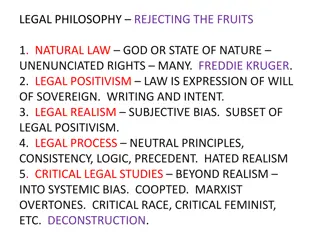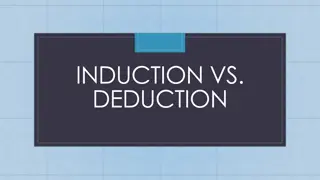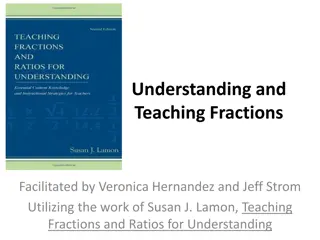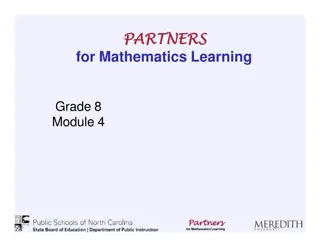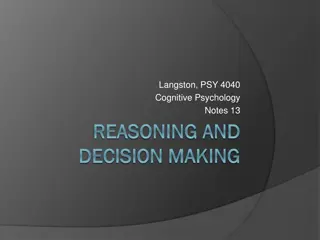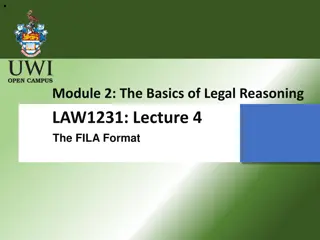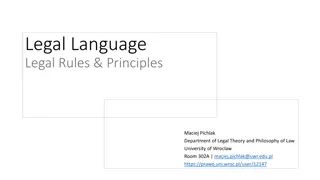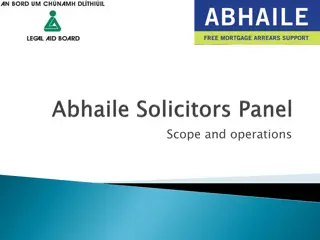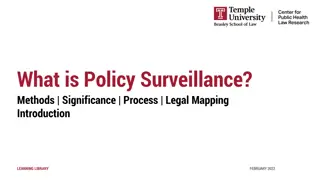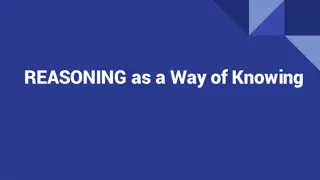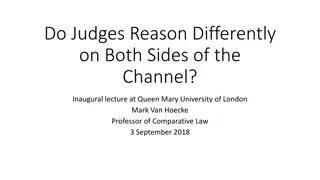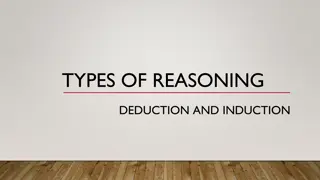Enhancing Math Skills for Year 6 Students Through Reasoning and Problem-Solving
Explore the shift towards math mastery, reasoning, and problem-solving strategies in Year 6 parent workshops. Learn why these methods differ from traditional approaches, emphasizing understanding over rote memorization. Discover the key skills needed for mathematical reasoning and how to support you
0 views • 23 slides
Understanding Inductive and Deductive Reasoning
Inductive reasoning involves drawing general conclusions from specific observations, while deductive reasoning starts with general premises to derive specific conclusions. Induction uses experience or experimental evidence to make broad conclusions, while deduction follows from general to specific.
5 views • 7 slides
Understanding the Difference Between Legal Information and Legal Advice
Legal information provides facts about the law and legal processes, while legal advice offers guidance on courses of action to further interests. Legal information is like the rules of a game, explaining basics, while legal advice is akin to the strategies for winning. This article explores the dist
0 views • 12 slides
Clinical Reasoning Worksheet for Differential Diagnoses
A Diagnostic Clinical Reasoning Worksheet created by Jennifer Jeffrey Bell, PT, ScD, COMT, to guide students through the diagnostic process, enhancing their clinical reasoning skills. The worksheet helps in selecting appropriate diagnoses based on patient demographics, describing patient presentatio
0 views • 9 slides
Understanding Statutory Interpretation in Legal Context
Explore the intricacies of statutory interpretation, linguistic and non-linguistic methods, and types of interpretation in legal contexts. Uncover the significance of legal reasoning, historical perspectives, and comparisons between Anglo-Saxon and Continental legal cultures. Delve into the complexi
1 views • 17 slides
Understanding Deductive Reasoning and Problem Solving in Logic
Explore the concepts of deductive reasoning, problem-solving logic, and Venn diagrams in this informative content. Learn about the process of drawing conclusions from known facts, using syllogisms to make valid arguments, and understanding the difference between truth and validity in deductive reaso
7 views • 16 slides
Understanding the CAT4 Assessment and Reports
CAT4, the Cognitive Abilities Test Fourth Edition, assesses students' abilities in verbal, quantitative, non-verbal, and spatial reasoning. It distinguishes between ability and attainment testing and is used to identify academic potential, understand student thinking, determine support needs, highli
1 views • 15 slides
Role and Responsibility of Legal Aid Panel Lawyers Presentation
The presentation by Rajasthan State Legal Services Authority discusses the vital role of legal aid panel lawyers in providing legal services to the marginalized and weaker sections of society. It emphasizes the responsibilities of panel lawyers in offering competent legal assistance, spreading legal
0 views • 22 slides
Dual Process Theory in Clinical Reasoning: A Case Study Analysis
Understanding dual process theory in clinical reasoning is crucial for healthcare professionals. This case study delves into the application of System 1 and System 2 thinking in diagnosing a 60-year-old woman presenting with chorea and weight loss. System 1 involves intuitive, quick decision-making
2 views • 24 slides
Bachelor of Laws (LLB) Programme at General Sir John Kotelawala Defence University – Faculty of Law
The Bachelor of Laws (LLB) Programme at General Sir John Kotelawala Defence University's Faculty of Law offers a specialized education in law with a strong focus on practical skills. Students develop legal knowledge, critical analysis abilities, and ethical reasoning essential for the legal professi
0 views • 19 slides
Enhancing Quality Standards of Legal Clinical Education in Ukraine
The Association of Legal Clinics of Ukraine (ALCU) is dedicated to promoting high-quality legal clinical education in the country. They have established standards and assessment tools to ensure the effectiveness of legal clinics, with a focus on providing free legal aid and raising legal awareness.
1 views • 10 slides
Significance and Utility of Jurisprudence in the Legal Field
Jurisprudence plays a crucial role in scholarship, research, and the development of society by enhancing legal, political, and social thinking. It aids in clarifying legal concepts, promoting logical analysis, and guiding lawyers and judges in interpreting laws effectively. Through jurisprudence, in
1 views • 4 slides
Understanding Bayesian Reasoning: A Comprehensive Overview
Bayesian reasoning involves utilizing probabilities to make inferences and decisions in the face of uncertainty. This approach allows for causal reasoning, decision-making under uncertainty, and prediction based on available evidence. The concept of Bayesian Belief Networks is explored, along with t
1 views • 33 slides
Enhancing Clinical Reasoning Training in Medical Education
Integrating research activities into educational programs is essential for advancing clinical reasoning training in medical education. This study explores different teaching approaches for clinical reasoning, focusing on addressing traditional teaching drawbacks and implementing simulation encounter
0 views • 31 slides
Understanding Deductive and Inductive Reasoning
Explore the world of deductive and inductive arguments through examples of deductive reasoning based on definitions and math, including categorical syllogisms, hypothetical syllogisms, and disjunctive syllogisms. Delve into inductive reasoning and the key distinctions between deductive and inductive
0 views • 26 slides
Access to Justice Through Public Legal Education in Alberta
The Centre for Public Legal Education Alberta (CPLEA) is a not-for-profit organization offering plain language legal education and information to empower individuals in understanding their rights and responsibilities. Public Legal Education (PLE) helps people address legal issues independently by pr
0 views • 20 slides
Understanding Laws of Logic and Logical Reasoning
Laws of logic play a crucial role in reasoning and making deductions. This comprehensive guide explains the use of contrapositives, examples of conditional statements, and the significance of laws like the Law of Syllogism. Understanding these principles helps in effectively analyzing statements and
0 views • 8 slides
Introduction to Symbolic Logic: Understanding Logical Inferences
Logic is the study of reasoning methods to distinguish between correct and incorrect arguments. Symbolic Logic involves representing logic symbolically for easier understanding and manipulation. Logical inferences help in making decisions based on reasoning chains. The content discusses the use of l
1 views • 28 slides
Algebra and Geometry Reasoning: Concepts and Proofs
Explore key concepts in algebra and geometry reasoning, including properties of equality, distributive property, and proofs using deductive reasoning. Practice solving equations, identifying properties of congruence, and writing two-column proofs to justify mathematical statements.
0 views • 13 slides
Understanding Legal Philosophy: Rejection of Traditional Frameworks
Explore various schools of legal philosophy such as natural law, legal positivism, legal realism, legal process, and critical legal studies. Discover the evolution of civil rights through key amendments and landmark cases shaping modern legal interpretations.
0 views • 194 slides
Understanding Deductive and Inductive Reasoning in Problem-Solving
Explore the differences between deduction and induction in problem-solving approaches. Deductive reasoning starts with a general statement and moves to specifics, offering certainty and objectivity, while inductive reasoning begins with specifics and arrives at a generalization, providing flexibilit
0 views • 11 slides
Understanding Legal Aid and Access to Justice
Legal aid is a state-funded support system aimed at providing legal assistance to individuals who cannot afford legal help. However, the availability of legal aid has been significantly impacted over the years by various acts and changes in the legal system. The unmet need for legal services arises
0 views • 22 slides
Mastering Fractional and Proportional Reasoning Workshop
Dive into the world of fractions and proportions in this workshop facilitated by Veronica Hernandez and Jeff Strom, based on the work of Susan J. Lamon. Explore critical components like units, equivalence, comparison techniques, and fraction sense, without relying on traditional rules. Embrace reaso
0 views • 40 slides
Exploring Proportional Reasoning in Grade 8 Mathematics Learning
Dive into the world of proportional reasoning in Grade 8 mathematics with a focus on identifying better buys, strategies for decision-making, and the importance of developing proportional thinking skills. Discover the significance of proportional reasoning as a key element in the curriculum, its imp
0 views • 55 slides
Legal Aid Provision and Access: Challenges and Solutions
Rebecca Rayment, a former Legal Aid lawyer and current Chief Executive of Manuel Bravo Project, addresses the complexities of accessing legal assistance, specifically focusing on Legal Aid for vulnerable asylum seekers and migrants. The presentation delves into the current legal advice provision, ch
0 views • 15 slides
Understanding Reasoning and Decision-Making in Cognitive Psychology
Exploring the intricacies of reasoning, decision-making, and logic in cognitive psychology, this content delves into how humans process information, make choices based on heuristics, and struggle with understanding probability. The challenges in conditional reasoning are highlighted through examples
0 views • 79 slides
Understanding the FILA/IRAC Format for Legal Reasoning
Explore the FILA/IRAC format for writing legal documents, learn to identify correct and incorrect examples, and understand how to apply this format in problem-solving scenarios. The lecture introduces the basics of legal reasoning, focusing on the essential components of Facts, Issues, Law/Rule, App
0 views • 27 slides
Understanding Legal Reasoning: A Comprehensive Insight
Legal reasoning involves navigating through gaps, inconsistencies, and ambiguities in the law to interpret and apply legal norms effectively. This process of validation, interpretation, and application helps legal practitioners optimize the legal system and adapt it to real-life cases. The presentat
0 views • 21 slides
Iowa Legal Aid: Free Legal Assistance for Low-Income Iowans
Iowa Legal Aid offers free legal assistance to low-income Iowans, covering a range of civil legal issues such as family law, housing, consumer rights, and more. Services are provided through regional offices across Iowa, with easy application processes and multilingual support available. Learn how t
1 views • 26 slides
Introduction to Code Reasoning in CSE331 Lecture
In this lecture, we delve into the fundamentals of code reasoning, focusing on forward and backward reasoning techniques in straight-line and if-statement code. The session includes reviewing the practice of identifying the strongest assertions and understanding the dual purposes of proving code cor
0 views • 24 slides
Understanding the Finnish Legal Profession of Attorneys-at-law
Attorneys-at-law in Finland are highly trained legal professionals who play a crucial role in upholding the rule of law. Only members of the Bar Association can hold this title, ensuring quality legal services for clients. The profession includes different roles such as licensed legal counsel, publi
0 views • 16 slides
Evolution of Legal Aid: From Inception to Present Challenges
The evolution of legal aid from its establishment in 1949 to the current challenges faced post the Legal Aid, Sentencing and Punishment of Offenders Act 2012 has been marked by changes in funding, administration, and accessibility. Despite initial state-funded schemes and subsequent reforms, recent
0 views • 24 slides
Legal Language, Rules, and Principles: Understanding Norm Structures and Legal Personhood
Explore the structure of legal norms, including their components - hypothesis and disposition. Learn about the addressee of norms, legal personhood, and legal capacity. Discover how in New Zealand, land and rivers have been granted personhood, akin to corporations, in legal terms. Dive into a case s
0 views • 20 slides
Legal Aid Board and Abhaile: Providing Legal Assistance to Those in Need
Legal Aid Board offers civil legal aid and advice to individuals with insufficient means, following the Civil Legal Aid Regulations. Abhaile provides financial and legal guidance to insolvent individuals at risk of losing their homes. The solicitors panel, established by the Board, ensures legal ser
0 views • 27 slides
Overview of Legal Philosophy and Civil Rights Amendments
Understanding various legal philosophies such as natural law, legal positivism, legal realism, legal process, and critical legal studies, this content delves into the historical context of civil rights amendments, including the 13th, 14th, and 15th Amendments. It discusses significant cases and prov
0 views • 194 slides
Understanding Policy Surveillance and Legal Mapping in Public Health Law Practice
Policy surveillance involves the systematic tracking of public health laws and policies over time and across jurisdictions using a rigorous scientific approach to generate data for evaluation and research. This process helps create legal data, build workforce legal capacity, support innovation diffu
0 views • 10 slides
Exploring Reasoning as a Method of Knowledge Acquisition
Reasoning serves as a fundamental way of knowing, enabling individuals to transcend immediate experiences, build knowledge, and evaluate beliefs. This process involves the application of logic, examining the interplay between beliefs, ideas, and truth. By integrating reason with imagination, individ
0 views • 37 slides
Contrasting Legal Reasoning in Common Law and Continental Law Systems
This inaugural lecture explores the differences in legal reasoning between judges on both sides of the English Channel. It delves into the declaratory theory of decision-making in Common Law and the application of legislative intent in Continental Law. The lecture also touches on the contrasting ind
0 views • 48 slides
TYPES OF REASONING DEDUCTION AND INDUCTION
Reasoning involves a connected sequence of thoughts leading to a conclusion. Deductive reasoning moves from general to specific, identifying assumptions and hidden premises. Categorical syllogisms demonstrate valid and sound argument structures, while real-life arguments may require uncovering assum
0 views • 21 slides
Forms of Moral Reasoning and Ethics in Decision-Making
Explore the main forms of moral reasoning in ethical decision-making, including virtue ethics, deontological reasoning, and teleological reasoning. Understand the importance of developing ethical virtues and principles in guiding behavior. Delve into examples of reasoning from virtue and deontologic
0 views • 28 slides
